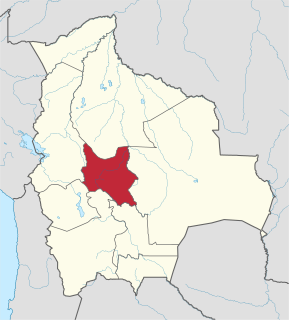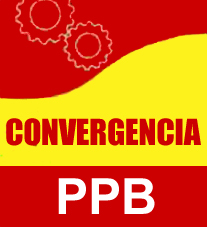
The politics of Bolivia takes place in a framework of a presidential representative democratic republic, whereby the president is head of state, head of government and head of a diverse multi-party system. Executive power is exercised by the government. Legislative power is vested in both the government and the two chambers of parliament. Both the Judiciary and the electoral branch are independent of the executive and the legislature. After the 2014 election, 53.1% of the seats in national parliament were held by women, a higher proportion of women than that of the population.

Cochabamba, from Quechua qucha or qhucha, meaning "lake", pampa meaning "plain", is one of the nine departments of Bolivia. It is known to be the "granary" of the country because of its variety of agricultural products from its geographical position. It has an area of 55,631 km². Its population in the 2012 census was 1,758,143. Its capital is the city of Cochabamba, known as the "City of Eternal Spring" and "The Garden City" because of its spring-like temperatures all year.

Elections in Bolivia gives information on elections and election results in Bolivia.

The Movement Without Fear is a progressive political party in Bolivia. MSM was founded on March 1, 1999.
The Confederation of Indigenous Peoples of Bolivia,, is a national representative organization of the Bolivian indigenous movement. It was founded in October 1982 in Santa Cruz de la Sierra as the Confederation of Indigenous Peoples of the Bolivian East, with the participation of representatives of four indigenous peoples of the Bolivian East: Guarani-Izoceños, Chiquitanos, Ayoreos and Guarayos.

The National Unity Front is a political party in Bolivia. It was founded in late 2003 by Samuel Jorge Doria Medina Auza, who had broken with the Revolutionary Left Movement earlier that year. It has thirty six members of the Chamber of Deputies in the Plurinational Legislative Assembly. Despite its substantial share of the urban vote, and sixteen former mayors, it does not control any city halls or governorships. The party is closely identified with Doria Medina's cement company Sociedad Boliviana de Cemento (Soboce).

The Media Luna or Media Luna Ampliada refers to a group of four departments – Santa Cruz, Beni, Pando, and Tarija – in Bolivia which became the geographic area of opposition to the national government led by Evo Morales and the Movement for Socialism (MAS).

The Bolivian Constituent Assembly, convened on August 6, 2006 in Sucre, with the purpose of drafting a new national constitution by December 14, 2007; extended from the original deadline of August 6, 2007. The Assembly approved the new Political Constitution of the State on 9 December 2007. It was put to a national referendum held on 25 January 2009, and went into force on 7 February 2009.

The following outline is provided as an overview of and topical guide to Bolivia:

A vote of confidence in President Evo Morales in the form of a referendum was held in Bolivia on 10 August 2008. The vote was held to determine whether Morales, Vice President Álvaro García Linera, and eight out of nine departmental Prefects should stay in office. Morales received more than 67% support and six of the eight prefects were returned. The prefects of Cochabamba Department and La Paz Department were defeated and had to face re-election.

Tarabuco Municipality is the first municipal section of the Yamparáez Province in the Chuquisaca Department, Bolivia. Its seat is Tarabuco. Its population is overwhelmingly indigenous: of 10,530 people 15 or older in the 2001 Census, 9,834 self-identified with an indigenous people; 9,779 to the Quechua people, 29 Aymara, 15 to another indigenous people, and 7 as Guaraní. On 6 December 2009, its residents voted in favor of indigenous autonomy for the municipality, with a vote of 90.8%.

The 2010 Bolivian regional elections were held on 4 April 2010. Departmental and municipal authorities were elected by an electorate of approximately 5 million people. Among the officials elected are:

Plan Progress for Bolivia – National Convergence was a coalition that was Bolivia's largest national opposition political party following the 2009 general elections. PPB-CN is a Bolivian political alliance of the right-wing formed in advance of the 2009 elections. The alliance was created at a meeting in La Paz's Zona Sur on 4 September 2009 by New Republican Force represented by Manfred Reyes Villa, Plan Progress for Bolivia, represented by José Luis Paredes, the former prefect of La Paz department; Autonomy for Bolivia led by Luis Alberto Serrate Middagh; Peoples Party led by Pablo Nicolás Camacho Bedregal; and the Nationalist Revolutionary Movement, led by Guillermo Bedregal Gutiérrez. However, the alliance did not continue to function in Bolivia's 2014 elections, and several of its elected senators stated in late 2013 that its role is ending.
Usos y costumbres is a legal term denoting indigenous customary law in Latin America. Since the era of Spanish colonialism, authorities have recognized local forms of rulership, self governance, and juridical practice, with varying degrees of acceptance and formality. The term is often used in English without translation.
The first Bolivian judicial election was held on 16 October 2011. The national vote was held to elect magistrates to serve on the Supreme Tribunal of Justice, the Plurinational Constitutional Tribunal, the Agro-environmental Tribunal and members of the Council of the Judiciary. It was originally scheduled to be held on 5 December 2010, but officials of the National Electoral Court and of the MAS majority in the Plurinational Legislative Assembly delayed it. The vote will be the first time that a Latin American country directly elects its highest judicial officials.

The Presidency of Evo Morales began on January 22, 2006 when Evo Morales was inaugurated as the 80th President of Bolivia, following his victory in the 2005 general election, where he won 53.7% of the vote, defeating Jorge Quiroga, Samuel Doria Medina, and several other candidates. Morales increased taxation on the hydrocarbon industry to bolster social spending, emphasising projects to combat illiteracy, poverty, racism, and sexism. Vocally criticizing neoliberalism and reducing Bolivia's dependence on the World Bank and International Monetary Fund, his administration oversaw strong economic growth while following a policy termed "Evonomics" which sought to move from a liberal economic approach to a mixed economy. Scaling back U.S. influence in the country, he built relationships with leftist governments in the Latin American pink tide and signed Bolivia into the Bolivarian Alliance for the Americas. Attempting to moderate the left-indigenous activist community, his administration also opposed the right-wing autonomist demands of Bolivia's eastern provinces. Winning a recall referendum in 2008, he instituted a new constitution that established Bolivia as a plurinational state and was re-elected in 2009. His second term witnessed the continuation of leftist policies and Bolivia's joining of the Bank of the South and Community of Latin American and Caribbean States; he was again reelected in the 2014 general election.
The National Council of Ayllus and Markas of Qullasuyu is a confederation of traditional governing bodies of Quechua-, Aymara- and Uru-speaking highland indigenous communities in the departments of La Paz, Oruro, Potosí, Cochabamba, Chuquisaca and Tarija, Bolivia. Specifically, it represents the following 16 suyus: Jacha Carangas, Jatun Quillacas, Asamajaquis, Charcas Qara Qara, Council of Ayllus of Potosí, Qara Qara Suyu, Sora, Kallawaya, Leco, Larecaja, Colla, Chui, Paca Jake, Ayllus of Cochabamba, Kapaj Omasuyus and Yapacaní. CONAMAQ was founded on March 22, 1997, with the purpose of restoring the self-governance of "original nations" including "collective rights to land and natural resources, re-definition of administrative units and self-determination exercised through indigenous autonomies and direct representation in state institutions." CONAMAQ is a member of the National Coordination for Change, and of the Andean Coordination of Indigenous Organizations. It was a member of the Pact of Unity in Bolivia from its founding until December 2011.

















